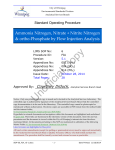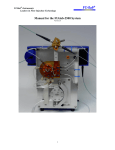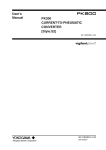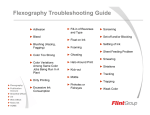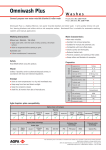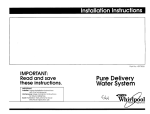Download Web Offset Heatset Troubleshooting Guide
Transcript
Web Offset Heatset Troubleshooting Guide ► Blistering ► Marking ► Blocking ► Misting / Slinging ► Register – Running Direction ► Register – Side-to-Side ► Color Variation ► Mottle ► Dot Gain – On Press ► Picking / Linting ► Dot Gain – Prepress ► Piling ► Drying ► Plate Blinding – Chemical ► Roller Stripping ► Rub-Off / Scuffing ► Scumming ► Gloss Ask about: ► Flexography ► Pub Gravure ► Pkg Gravure ► Sheetfed Offset ► UV ► Web Offset ► News Ink HOME ► Hickies ► Plate Blinding – Mechanical ► Ink / Water Balance ► Poor Mileage ► Tinting / Toning ► Trapping ► Web Breaks – Paper ► Web Breaks – Press, Ink Web Offset Heatset Troubleshooting Guide Blistering Symptom: Moisture explosions in the paper cause bubbles to form. Cause: 1. Oven heat too high 2. Excess dwell time in oven 3. Paper has excessive moisture, improper density or base 4. Ink pigmentation too low Ask about: ► Flexography ► Pub Gravure ► Pkg Gravure ► Sheetfed Offset ► UV ► Web Offset ► News Ink HOME Solution: 1. Reduce oven temperature; consult ink manufacturer for inks compatible with lower temperatures 2. Adjust press speed, web dwell time in dryer and chill roll temperature to optimum levels 3. Run roll from different paper machine position. Consult paper manufacturer; change stock if necessary 4. Consult ink manufacturer to adjust pigment strength Web Offset Heatset Troubleshooting Guide Blocking Symptom: Undesired adhesion between printed materials. Ask about: ► Flexography ► Pub Gravure ► Pkg Gravure ► Sheetfed Offset ► UV ► Web Offset ► News Ink HOME Cause: 1. Ink dries too slowly 2. Improper silicone applicator setting Solution: 1. See DRYING 2. Check concentration and reduce film thickness 3. Excessive pressure on log or in stack 3. Reduce strap pressure or reduce stack height Web Offset Heatset Troubleshooting Guide Color Variation Symptom: Inconsistent color reproduction between proof and print. Cause: 1. Variation between proof and printing substrates 2. Special, spot color does not match proof 3. Excessive heat causes too much penetration of ink resin, poor gloss Ask about: ► Flexography ► Pub Gravure ► Pkg Gravure ► Sheetfed Offset ► UV ► Web Offset ► News Ink HOME Solution: 1. Adjust ink film thickness to that of proof; consult substrate manufacturer for stock more similar to proof stock; consult ink manufacturer for ink with hue and hold-out adjusted for current paper 2. Consult ink manufacturer 3. Reduce drier temperature; increase press speed Web Offset Heatset Troubleshooting Guide Dot Gain – On Press Symptom: Printed halftones appear muddy, show higher values than proof. Cause: 1. Improper pressure settings between plates, blankets and roller 2. Doubled or slurred dots 3. Ink viscosity too low 4. Ink too water-receptive 5. Plate not sharp enough Ask about: ► Flexography ► Pub Gravure ► Pkg Gravure ► Sheetfed Offset ► UV ► Web Offset ► News Ink HOME 6. Ink color strength too low Solution: 1. Adjust to proper pressure settings 2. Adjust plate-to-blanket pressure; check for and correct blanket and roller slippage; assure mechanical stability at high speeds 3. Consult ink manufacturer 4. Consult ink manufacturer 5. Coordinate with prepress for sharper halftones, negatives, positives and plates 6. Consult ink manufacturer Web Offset Heatset Troubleshooting Guide Dot Gain – Prepress Symptom: Dot gain occurs during prepress reproduction. Ask about: ► Flexography ► Pub Gravure ► Pkg Gravure ► Sheetfed Offset ► UV ► Web Offset ► News Ink HOME Cause: Film 1. Dots on film too soft; too much fringe 2. Dot percentages on the film inaccurate Solution: Film 1. Check films for halos or veiled dots; increase the output resolution on image setters 2. Measure the films to determine accuracy; if necessary, recalibrate image setters Plate 1. Negative plates over-exposed Plate 1. Use a plate control target and plate reading instrument to evaluate the plates; cut back on plate exposures 2. Check vacuum gauge (25-27psi); look for clogged hoses, worn areas and/or leaks 3. Change the vacuum frame lamps, track and record usage of time on lamps 4. Check developer chemistry and brush support/contact 2. Poor contact between film and plate in vacuum frame 3. Improper lamp spectral intensity (aged lamps) 4. Plate is underdeveloped or has insufficient support next to brushes 5. Incorrect digital plate curve being applied for paper/ink combination 5. Apply correct curve to plate Web Offset Heatset Troubleshooting Guide Drying Symptom: Ink film tacky during press delivery and binding, resulting Solution: in setoffCause: or marking. 1. Dryer temperature too low for press speed; insufficient solvent release from ink 2. Ink film too thick 3. Insufficient evacuation of solvent vapors from web as it leaves dryer 4. Chill roll too warm; ink resins failing to set adequately 5. Paper contains excessive water; nonporous stock 6. Improper fountain solution pH/conductivity 7. Ink taking up too much water Ask about: 8. ► Flexography ► Pub Gravure 9. ► Pkg Gravure ► Sheetfed Offset ► UV 10. ► Web Offset ► News Ink HOME Uneven plate dampening Ink film only dries on surface, trapping solvents Ink films do not dry at normal temperatures 1. Increase dryer temperature or reduce press speed 2. Adjust press setting to carry less ink; consult ink manufacturer 3. Increase velocity of air in air knife scavenger at dryer exit 4. Reduce chill roll temperature while avoiding condensation 5. Change stock 6. Adjust fountain solution to proper pH/conductivity 7. Adjust to proper ink/water balance; consult ink manufacturer 8. Clean dampeners thoroughly; check windows, vents and forced air systems to prevent drafts 9. Adjust oven temperature; reduce press speed 10. Consult ink manufacturer Web Offset Heatset Troubleshooting Guide Gloss Symptom: Ink has improper reflective properties. Cause: 1. Stock too absorbent; paper surface too rough/grainy 2. Press dampeners: inking system contains excessive water 3. Ink film too thin 4. Dryer temperature too high Ask about: ► Flexography ► Pub Gravure ► Pkg Gravure ► Sheetfed Offset ► UV ► Web Offset ► News Ink HOME 5. Excessive ink vehicle penetration into stock Solution: 1. Change to smoother, nonabsorbent stock with more ink hold-out; consult paper manufacturer 2. Reduce amount of fountain solution; consult ink manufacturer for more water-resistant ink 3. Increase ink film thickness 4. Reduce press speed to allow lower oven temperature; consult ink manufacturer to reformulate ink 5. Reduce dryer temperature and maintain sufficient chilling capacity; increase press speed to reduce oven dwell time; consult ink manufacturer for ink with more hold-out Web Offset Heatset Troubleshooting Guide Hickies Symptom: Donut-shaped or irregularly shaped white spots on printed surface. Cause: 1. Dried ink particles 2. Roller particles 3. Glazed roller 4. Foreign particles Ask about: ► Flexography ► Pub Gravure ► Pkg Gravure ► Sheetfed Offset ► UV ► Web Offset ► News Ink HOME 5. Loose paper coatings or dust Solution: 1. Clean press thoroughly and regularly; remove dried ink from fountain and roller ends 2. Replace rollers if necessary 3. Use specially formulated glaze-removing materials or scrub roller with pumice and solvent 4. Improve housekeeping: a) check air systems for circulation of dust; b) vacuum surface of overhead fixtures such as lights; c) hang plastic sheeting over press 5. Consult paper manufacturer to install vacuum sheet cleaner NOTE: Properly maintained “hickie-picker” rollers do work. All require frequent scrubbing for optimum performance. Web Offset Heatset Troubleshooting Guide Ink / Water Balance Symptom: Frequent adjustments required on press to maintain print quality. Cause: 1. Excessive or insufficient fountain solution 2. Improper concentration of fountain solution 3. Improper dampening roller setting 4. Improper ink form roller settings 5. Improper ink fountain settings Ask about: ► Flexography ► Pub Gravure ► Pkg Gravure ► Sheetfed Offset ► UV ► Web Offset ► News Ink HOME 6. Ink too weak 7. Ink taking up too much water Solution: 1. Adjust dampener settings to proper levels 2. Adjust fountain solution to proper pH/conductivity 3. Reset rollers: insure that dampener rollers are driven by vibrator roller and not plate 4. Conduct ink stripe test to check form roller pressure; adjust if necessary 5. Adjust ink at fountain to proper level; allow adequate time for adjustment to take effect 6. Consult ink manufacturer 7. Adjust ink/water balance; consult ink manufacturer Web Offset Heatset Troubleshooting Guide Marking Symptom: Streaks, tracks or smudges on web due to mechanical contact. Cause: Solution: 1. Grater roller points too dull 2. Web bustle wheels touch image areas 3. Improper air flow 4. Chill roll too warm 5. Web temperature too low to drive off solvents 6. Press speed or job type beyond dryer capabilities 7. Non-absorbent stock 8. Ink film too thick 1. Install grater roller with sharper points 2. Move wheels so they touch only non-image areas; apply TEFLON® tape to make wheels less abrasive 3. Adjust airflow through oven; adjust web tension 4. Reduce temperature for post-chill roll temperature of 90° F or less; recommended temperature is 72-75° F. CAUTION: If chill rolls are too cold, condensation can occur. Reduce oven temperature to minimum necessary to get web through chilling and press folding operation 5. For impingement dryer, adjust flame tips to impinge properly; for velocity forced air dryer, raise air temperature; decrease press speed; increase air circulation; consult ink manufacturer for faster drying ink. CAUTION: Paper will burn at 451° F and can scorch at lower temperatures 6. Consult dryer manufacturer 7. Consult paper manufacturer; change stock 8. Reduce ink film; raise air temperature in dryer; reduce press speed to increase oven dwell time; consult ink manufacturer for faster drying ink Ask about: ► Flexography ► Pub Gravure ► Pkg Gravure ► Sheetfed Offset ► UV ► Web Offset ► News Ink HOME Web Offset Heatset Troubleshooting Guide Misting / Slinging Symptom: Excessive amount of ink being thrown from ink train rollers. Cause: 1. Excessive ink on rollers 2. Improper ink/water balance 3. Improperly set or worn rollers 4. Roller train too hot 5. Ink too long in body Ask about: ► Flexography ► Pub Gravure ► Pkg Gravure ► Sheetfed Offset ► UV ► Web Offset ► News Ink HOME Solution: 1. Adjust press to carry less ink; consult ink manufacturer for stronger ink 2. Adjust to proper ink/water balance 3. Adjust roller to appropriate settings; replace if necessary 4. Reduce temperature or increase flow of cooling water through rollers 5. Consult ink manufacturer Web Offset Heatset Troubleshooting Guide Mottle Symptom: Solids areas not uniform, resulting in uneven appearance. Cause: 1. Non-uniform stock surface 2. Improperly set or worn ink form rollers 3. Excessive linting 4. Printing pressure too high 5. Worn blanket 6. Improper ink/water balance 7. Poor ink transfer Ask about: ► Flexography ► Pub Gravure ► Pkg Gravure ► Sheetfed Offset ► UV ► Web Offset ► News Ink HOME Solution: 1. Consult paper manufacturer to change stock; consult ink manufacturer for ink with less penetration 2. Adjust rollers to proper settings; replace if necessary 3. See PICKING/LINTING 4. Reduce printing pressure 5. Replace blanket 6. Adjust to proper ink/water balance 7. Consult ink manufacturer Web Offset Heatset Troubleshooting Guide Picking / Linting Symptom: Picking: Lifting of the coating from coated stocks onto plates, blankets and/or ink train rollers. Linting: Accumulation of fibers from uncoated stocks onto plates, blankets and/or ink train rollers. Cause: 1. Too much water reaching paper 2. Improper concentration of fountain solution 3. Excessive lint, surface trash, coating dust on stock 4. Base stock picks Ask about: ► Flexography ► Pub Gravure ► Pkg Gravure ► Sheetfed Offset ► UV ► Web Offset ► News Ink HOME 5. Improperly packed cylinders: pressure too high for ink/stock combination 6. Blanket too tacky 7. Ink too tacky for stock Solution: 1. Adjust to proper ink/water balance 2. Adjust fountain solution to proper pH/conductivity 3. Make tape pulls from blanket; consult paper manufacturer 4. Reject stock if necessary; change to more lint- or pick-resistant stock 5. Adjust press; repack to manufacturer specifications 6. Consult blanket manufacturer; change blanket wash, treat blanket or change to less tacky blanket 7. Consult ink manufacturer to reduce ink tack Web Offset Heatset Troubleshooting Guide Piling Symptom: Build-up of ink on printing plates. Cause: 1. Paper problems 2. Improperly packed cylinders 3. Improperly set or worn rollers 4. Ink is waterlogged 5. Ink drying too fast Ask about: ► Flexography ► Pub Gravure ► Pkg Gravure ► Sheetfed Offset ► UV ► Web Offset ► News Ink HOME Solution: 1. See PICKING/LINTING 2. Check specifications and adjust cylinders 3. Check specifications and adjust rollers; replace if necessary 4. Adjust dampener settings; consult ink manufacturer 5. Consult ink manufacturer to adjust tack and stability Web Offset Heatset Troubleshooting Guide Plate Blinding – Chemical Symptom: Part or all of image on plate does not take ink. (See Plate Blinding – Mechanical) Cause: 1. Fountain solution too acidic 2. Excessive gum in fountain solution Ask about: ► Flexography ► Pub Gravure ► Pkg Gravure ► Sheetfed Offset ► UV ► Web Offset ► News Ink HOME 3. Plate cleaners and/or scratch removers have dried on plate image 4. Fountain system contaminated by detergent 5. Excessive fountain solution in ink 6. Improperly developed plates; gum adheres to image area Solution: 1. Adjust fountain solution to proper pH/conductivity 2. Re-etch plates and rub up image areas with press ink; drain fountain solution and fill with tap water; if image returns, replace tap water with fountain solution containing less gum 3. Rinse plate thoroughly and immediately after using these materials 4. Thoroughly rinse all parts in contact with detergent before re-installing in press 5. Reduce dampener setting to minimum level; consult ink manufacturer 6. Wash plate thoroughly; remake if necessary Web Offset Heatset Troubleshooting Guide Plate Blinding – Mechanical Symptom: Part or all of image on plate does not take ink. (See Plate Blinding – Chemical) Cause: 1. Excessive linting 2. Excessive plate-to-blanket pressure 3. Improperly set ink and dampening form rollers 4. Abrasive particles destroying images Ask about: ► Flexography ► Pub Gravure ► Pkg Gravure ► Sheetfed Offset ► UV ► Web Offset ► News Ink HOME Solution: 1. See PICKING/LINTING 2. Use pressure gauge to check pressure; adjust to proper level 3. Check setting and durometer; adjust or replace 4. Check ink grind, fountain solution, solvents, etc.; replace contaminated materials Web Offset Heatset Troubleshooting Guide Poor Mileage Symptom: Too few impressions per pound of ink. Cause: 1. Lack of control of ink densities 2. Ink penetrates stock too quickly 3. Improper ink/water balance 4. Low pigmented inks 5. Excessive waste on start-up 6. Improper estimates from job to job Ask about: ► Flexography ► Pub Gravure ► Pkg Gravure ► Sheetfed Offset ► UV ► Web Offset ► News Ink HOME Solution: 1. Adjust to lower print densities while maintaining acceptable quality 2. Consult ink manufacturer for ink with more holdout; use less porous stock 3. Adjust to proper ink/water balance 4. Consult ink manufacturer to reformulate ink with more strength 5. Improve start-up procedures 6. Establish ink history and consistent procedure to improve estimates Web Offset Heatset Troubleshooting Guide Register – Running Direction Symptom: After the press has been set for proper registration, misregistration occurs in running direction. Cause: 1. One or more plates are improperly set on cylinders 2. One or more plates are printing longer or shorter than others 3. 4. 5. 6. Ask about: ► Flexography ► Pub Gravure ► Pkg Gravure ► Sheetfed Offset ► UV ► Web Offset ► News Ink HOME 7. 8. Solution: 1. Handle plates more carefully on bending jig 2. Transfer packing from blanket to plate to shorten printing, or from plate to blanket to lengthen printing; maintain good web tension Uneven blanket packing; web tension 3. Adjust blanket packing until draws between units are equal will build up until the web snaps back 4. Increase web tension in infeed section of press Web tension too low 5. Equip press with constant tension infeed Web tension changes during run because infeed tension changes Ink tack at point of impression too 6. Increase web tension; reduce press speed; high, causing web to follow blanket; consult ink manufacturer for ink tack reduction can increase tension in localized areas Paper pile on blanket changes 7. Wash blanket more frequently; change to more blanket diameter moisture-resistant paper Paper roll out of round or has flat 8. Use constant-tension infeed; increase distance areas between infeed and first printing unit; change to roll without problem Web Offset Heatset Troubleshooting Guide Register – Side-to-Side Direction Symptom: After the press has been set for proper registration, misregistration occurs laterally. Cause: 1. Non-uniform moisture content across web causes corrugation of roll 2. Welts caused by rolls unwrapped in high humidity and allowed to stand. Welts occur not more than 25 mils into roll and can cause side-to-side misregister just after splicing 3. Paper varies in caliper across the web 4. Web has slack edges due to moisture pick-up while in the roll Ask about: ► Flexography ► Pub Gravure ► Pkg Gravure ► Sheetfed Offset ► UV ► Web Offset ► News Ink HOME 5. Ink tack too high at point of impression Solution: 1. Increase distance between infeed and first printing unit; use preheater on infeed and first printing unit to dry paper, even moisture content and flatten web; equip press with curved roller to spread and flatten web 2. Remove outer 25 mils of paper; do not unwrap rolls until just before going to press 3. Consult paper manufacturer 4. Keep rolls protected from atmospheric changes until they are mounted on the infeed stand; increase distance between infeed and first printing unit; increase web tension to tighten slack edges; equip press with curved roller on infeed to spread and flatten web; adjust the eccentric mounted infeed roller to balance edge tension 5. Consult ink manufacturer Web Offset Heatset Troubleshooting Guide Roller Stripping Symptom: Rollers do not accept ink. Cause: 1. Fountain solution too acidic 2. Excess water on press 3. Desensitized metal vibrator rollers 4. Glazed form roller 5. Excessive emulsification of ink Ask about: ► Flexography ► Pub Gravure ► Pkg Gravure ► Sheetfed Offset ► UV ► Web Offset ► News Ink HOME 6. Improperly set rollers 7. Ink too strong 8. Ink too water-resistant Solution: 1. Adjust fountain solution to proper pH/conductivity 2. Reduce dampener settings 3. Clean copperized rollers; ink rollers and wash again; use less gum in fountain solution 4. Remove rollers from press, de-glaze appropriately and rinse well 5. Reduce dampener settings; consult ink and dampening solution manufacturers 6. Adjust rollers to proper setting 7. Consult ink manufacturer 8. Consult ink manufacturer Web Offset Heatset Troubleshooting Guide Rub-Off / Scuffing Symptom: Printed ink appears dry, but exhibits poor resistance when abraded. Cause: 1. Improper ink/water balance 2. Paper contains too much water 3. Excessive ink 4. Improper pH of fountain solution 5. Improperly formulated ink Ask about: ► Flexography ► Pub Gravure ► Pkg Gravure ► Sheetfed Offset ► UV ► Web Offset ► News Ink HOME 6. Rough paper surface creates poor rub between unprinted and printed surfaces 7. Ink dries too slowly 8. Poor paper coating integrity Solution: 1. Adjust to proper ink/water balance 2. Change paper 3. Adjust press to carry less ink; reduce print density 4. Adjust fountain solution to proper pH/conductivity 5. Consult ink manufacturer to reformulate ink with more binding vehicle or rub resistance 6. Consult paper manufacturer for more absorbent stock; consult ink manufacturer to reformulate ink with more rub resistance 7. See DRYING 8. Consult paper manufacturer Web Offset Heatset Troubleshooting Guide Scumming Symptom: Non-image area of lithographic plate accepts ink in random areas. Cause: 1. Plate improperly processed or exposed to light 2. Low alcohol (or alcohol substitute) content in dampening system 3. Improper ink/water balance 4. Excessive printing pressure 5. Glazed blanket, ink rollers or dampening rollers Ask about: ► Flexography ► Pub Gravure ► Pkg Gravure ► Sheetfed Offset ► UV ► Web Offset ► News Ink HOME 6. Ink rollers overheated 7. Improper ink tack/viscosity ratio Solution: 1. Desensitize or remake plate; adjust plate-making process 2. Adjust fountain solution concentration to proper level 3. Adjust to proper ink/water balance 4. Reduce printing pressure to proper levels 5. Clean blanket and rollers thoroughly and recondition per manufacturer specifications 6. Check for worn bearings and replace if necessary; adjust ink rollers to proper pressure 7. Consult ink manufacturer Web Offset Heatset Troubleshooting Guide Tinting / Toning Symptom: Emulsified ink transferred to printed sheets as background tint. Solution: Cause: 1. Ink bleeds into fountain solution 2. Improper concentration of fountain solution 3. Pressure between plate and blanket too high 4. Improper setting of dampener or ink rollers 5. Ink insufficiently resistant to water Ask about: ► Flexography ► Pub Gravure ► Pkg Gravure ► Sheetfed Offset ► UV ► Web Offset ► News Ink HOME 6. Improperly exposed or developed plates 7. Improper ink/water balance 8. Paper chemicals contaminate ink train 9. Prolonged use of detergent or clean up solution 1. Adjust concentration of alcohol or alcohol substitute in fountain solution; consult ink manufacturer 2. Adjust fountain solution to proper pH/conductivity 3. Adjust pressure to manufacturer specifications 4. Adjust dampener/ink rollers to manufacturer specifications 5. Consult ink manufacturer to reformulate ink with greater water resistance 6. Replace plates if necessary; adjust plate-making process 7. Adjust to proper ink/water balance 8. Use low-tack ink, low water setting and low pressure setting; change paper 9. Remove detergent with water or petroleum solvent and change solution Web Offset Heatset Troubleshooting Guide Trapping Symptom: Cannot achieve good color balance or overall appearance. Cause: 1. Tack of inks out of sequence 2. Improperly balanced ink strength Ask about: ► Flexography ► Pub Gravure ► Pkg Gravure ► Sheetfed Offset ► UV ► Web Offset ► News Ink HOME 3. Unequal press stability of inks; succeeding inks tack up more quickly than preceding inks 4. Additive in ink creates film, preventing subsequent inks from adhering 5. Improper ink/water balance 6. Poor ink release from blanket 7. Improper register Solution: 1. Adjust inks to have progressively lower tack 2. Adjust inks to have progressively heavier film for optimum traps 3. Consult ink manufacturer 4. Consult ink manufacturer 5. Adjust to proper ink/water balance. See MOTTLE 6. Consult blanket manufacturer; consult ink manufacturer 7. See REGISTER Web Offset Heatset Troubleshooting Guide Web Breaks – Paper Symptom: Web routinely tears as it passes through press. (See Web Breaks – Press, Inks) Cause: 1. Excessive tension on edge(s) of web due to loss of moisture and shrinkage 2. Roll has dent or cut at end 3. Fiber cuts, hair cuts, wire holes, wrinkles, slime spots, foam spots, etc. 4. Bad mill splices Ask about: ► Flexography ► Pub Gravure ► Pkg Gravure ► Sheetfed Offset ► UV ► Web Offset ► News Ink HOME Solution: 1. Keep rolls completely and carefully wrapped until mounted on press 2. Sand or cut paper until edge is smooth, if possible; otherwise remove damaged portion of roll and replace; consult paper manufacturer 3. Consult paper manufacturer if defects are common 4. Consult paper mill if defects are common Web Offset Heatset Troubleshooting Guide Web Breaks – Press, Inks Symptom: Web routinely tears as it passes through press. (See Web Breaks – Paper) Ask about: ► Flexography ► Pub Gravure ► Pkg Gravure ► Sheetfed Offset ► UV ► Web Offset ► News Ink HOME Cause: Press 1. Web tension too high 2. Printing units or press elements out of line (often indicated by diagonal wrinkles in web 3. Improper blanket pressures Solution: Press 1. Reduce web tension 2. Check and adjust press alignment Ink 4. Ink too tacky Ink 4. Consult ink manufacturer to reformulate ink with less tack 5. Consult ink manufacturer to reformulate ink 6. Consult ink manufacturer 5. Ink body may be too long causing drips from fountain nip to web 6. Ink pigment too weak, causing ink fountain key to be opened and allowing ink to drip 7. Ink misting/slinging 3. Adjust blanket packing to manufacturer specifications 7. See MISTING / SLINGING





























